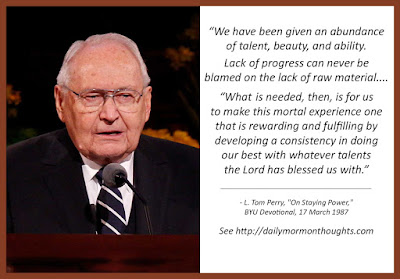"Peace upon earth is not to be established by Congress or Parliament, or by a group of international representatives. Peace is not a thing that can be taken on, then taken off again, as we do a piece of clothing. Peace is quite different from that. Peace cannot be legislated into existence. It is not the way to lasting peace upon earth. That, every man here understands.
"Remember, the Savior Himself tried to point that out to us, for when he spoke to his disciples and said, 'Peace I give unto you, peace I leave with you,' He added, 'Not as the world giveth, give I unto you' (John 14:27).
"Peace comes from within; peace is myself, if I am a truly peaceful man. The very essence of me must be the spirit of peace. Individuals make up the community, and the nation—an old enough doctrine, which we often overlook—and the only way to build a peaceful community is to build men and women who are lovers and makers of peace. Each individual, by that doctrine of Christ and His Church, holds in his own hands the peace of the world.
"That makes me responsible for the peace of the world, and makes you individually responsible for the peace of the world. The responsibility cannot be shifted to someone else. It cannot be placed upon the shoulders of Congress or Parliament, or any other organization of men with governing authority.
"I wonder if the Lord did not have that in mind when he said: '...the kingdom of God is within you' (Luke 17:21), or perhaps we should re-emphasize it and say: 'The kingdom of God is within you.' ...
"If a man but conform to, if he be in harmony with, eternal law, peace will be his. That is a simple formula which refers to body, mind, and spirit, and to our neighbors. If I obey the physical laws of the body, physical peace will be mine. If I obey the laws of mental health, I shall be mentally at peace. If I obey the spiritual laws which God has given, I shall likewise find peace, the highest peace. If I love my neighbors, even as I love myself and my God, and all men do the same, there will be complete social peace. Such obedience can be yielded; such harmony can be won. It has been done by men; it can be done again. Such harmony with law lies at the foundation of the problem of our searching and reaching out for peace in our troubled world."
- John A. Widtsoe, "The Nature of Peace," Conference Report, October 1943, pp. 112-116
Click here to read the full talk
What is peace? Where does it come from? Elder Widtsoe gave this address in 1943, as the world was in the midst of World War II. He spoke of the hope for resolution of the conflict, and how it might be obtained through diplomacy or negotiations. But he believed such a peace would never last; you can't legislate lasting peace. True peace comes as men turn to the doctrine of Christ, and can only come about as we individually create peace in our own life:
I appreciated Elder Widtsoe's further analysis of the process, describing actions that lead to desired results:
- Obedience of the body's physical laws 🡲 physical peace
- Obedience to laws of mental health 🡲 mental peace
- Obedience to God's spiritual laws 🡲 the highest peace
- Loving neighbors as self and God 🡲 social peace
(Compilation and commentary by David Kenison, Orem, Utah, 2022)
January 31, 2017
January 31, 2017


































